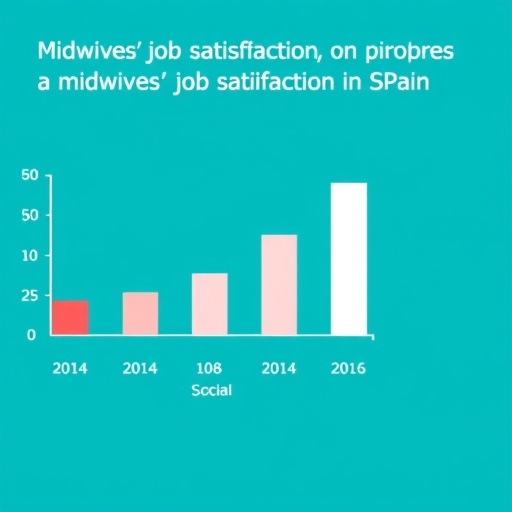In a significant advancement for obstetric care in Spain, researchers have developed and validated a novel measurement tool known as the Labour Ward Job Satisfaction Scale for Midwives (LWJSS-M). This groundbreaking instrument aims to assess the job satisfaction levels of midwives working in labor wards, thereby addressing a critical gap in occupational health literature. Recent studies highlight that midwives play an essential role in maternal and neonatal outcomes; thus, their job satisfaction directly influences the quality of care provided. The creation of the LWJSS-M is vital, as it not only enhances understanding of midwives’ experiences but also helps in formulating strategies for improving workplace environments.
The project’s inception stemmed from a pressing need to evaluate midwives’ roles in Spain’s healthcare system. Traditionally, midwives’ job satisfaction has not received the attention it deserves, which led to the researchers’ intent to bridge this knowledge gap. The LWJSS-M allows for a structured evaluation, facilitating insight into various factors that contribute to a midwife’s job satisfaction, including work conditions, relationships with colleagues, and overall mental well-being. Additionally, it brings to light the stressors that hinder job satisfaction, allowing healthcare administrators to target specific areas requiring enhancement.
To construct the LWJSS-M, the research team employed rigorous methodologies typically associated with psychometric scale development. They initiated the construction phase through extensive literature reviews and focus group discussions with practicing midwives. This participatory approach ensured that the scale was grounded in real-world experiences and sentiments, thus enhancing the tool’s relevance and applicability. The discussions unearthed valuable information pertaining to the variables influencing midwives’ satisfaction, fostering a holistic representation within the scale.
Following the initial construction phase, the LWJSS-M underwent a thorough validation process, which involved a diverse cohort of midwives across various healthcare settings in Spain. Employing quantitative methods, the researchers conducted factor analyses to validate the scale’s structural integrity and reliability. This meticulous approach confirmed that the LWJSS-M is not only a reliable tool for measuring job satisfaction among midwives but also adaptable across different organizational contexts. Consequently, healthcare entities can utilize this instrument to inform policies aimed at enhancing midwives’ work environments and ultimately improving patient care.
The implications of this research extend beyond mere academic interest, as the findings can lead to substantial improvements in workforce stability and satisfaction levels. Satisfied midwives are more likely to remain in their roles, which is fundamental given the ongoing global challenges of workforce shortages in healthcare. By focusing on job satisfaction, healthcare systems can potentially reduce turnover rates, lessen recruitment costs, and enhance the overall dynamics of labor wards. This in turn translates into improved continuity of care for patients, which is indispensable in reproductive health scenarios.
Moreover, the LWJSS-M sets a precedent for other countries facing similar challenges in evaluating healthcare worker satisfaction. The framework developed in this study provides a scalable model that can be adapted for other healthcare professionals, thereby fostering a widespread movement towards improved workplace satisfaction in the healthcare sector globally. By encouraging similar research in other regions, it paves the way for international collaborations aimed at enhancing maternal and neonatal health outcomes.
Yet, the journey does not end with the validation of the LWJSS-M. Ongoing research is essential to continually refine the instrument and ensure its relevance as workplace dynamics evolve. Future studies could explore longitudinal patterns in job satisfaction among midwives, assessing how changes in policy, management practices, and socio-economic factors influence their experiences over time. This may provide a more comprehensive understanding of job satisfaction as a dynamic construct subject to various influencing elements.
Engaging policymakers in the conversation around midwives’ job satisfaction is also crucial. The insights gained from utilizing the LWJSS-M can inform legislative initiatives aimed at improving workplace conditions. Advocacy for midwives’ rights and professional development opportunities can stem from the evidence generated by this research, highlighting the necessity of prioritizing job satisfaction in discussions surrounding healthcare workforce policies.
As the findings from the LWJSS-M begin to circulate within academic and professional spheres, it is anticipated that the discourse surrounding healthcare worker satisfaction will gain momentum. The hope is that this research catalyzes a transformative approach towards understanding and enhancing the workplace experiences of midwives. Without question, this instrument is an essential step toward fostering a healthier environment for one of the most pivotal groups in maternal and child health.
In conclusion, the construction and validation of the Labour Ward Job Satisfaction Scale for Midwives (LWJSS-M) marks a significant milestone in the ongoing quest to improve midwives’ occupational satisfaction in Spain. The research not only provides a reliable measurement tool but also opens up pathways for further exploration into the factors influencing job satisfaction among healthcare professionals more broadly. The potential impacts of this study extend far beyond the immediate context, presenting an opportunity for systemic change within healthcare systems globally.
Thus, as healthcare continues to evolve, the lessons drawn from the LWJSS-M and the midwives it seeks to serve will undoubtedly shape future research and policy directions. By prioritizing the satisfaction and well-being of midwives, we are not only investing in the professionals themselves but also in the enhanced care and outcomes for mothers and infants alike, underscoring the intertwined nature of workforce contentment and patient care quality.
Subject of Research: Job satisfaction of midwives in labor wards in Spain.
Article Title: Construction and validation of the “labour ward job satisfaction scale for midwives (LWJSS-M)” in Spain.
Article References:
Pérez-Castejón, M., Martínez-Alarcón, L., Leal-Costa, C. et al. Construction and validation of the “labour ward job satisfaction scale for midwives (LWJSS-M)” in Spain.
BMC Nurs 24, 1282 (2025). https://doi.org/10.1186/s12912-025-03934-9
Image Credits: AI Generated
DOI:
Keywords: Midwives, job satisfaction, healthcare, LWJSS-M, Spain, psychometric validation.
Tags: addressing job satisfaction gapsevaluation of midwives’ rolesfactors affecting midwives’ job satisfactionhealthcare system in Spainimproving work conditions for midwivesLabour Ward Job Satisfaction Scale for Midwivesmaternal and neonatal outcomesmental well-being of midwivesmidwives job satisfaction measurementobstetric care in Spainoccupational health literatureworkplace environment for midwives





